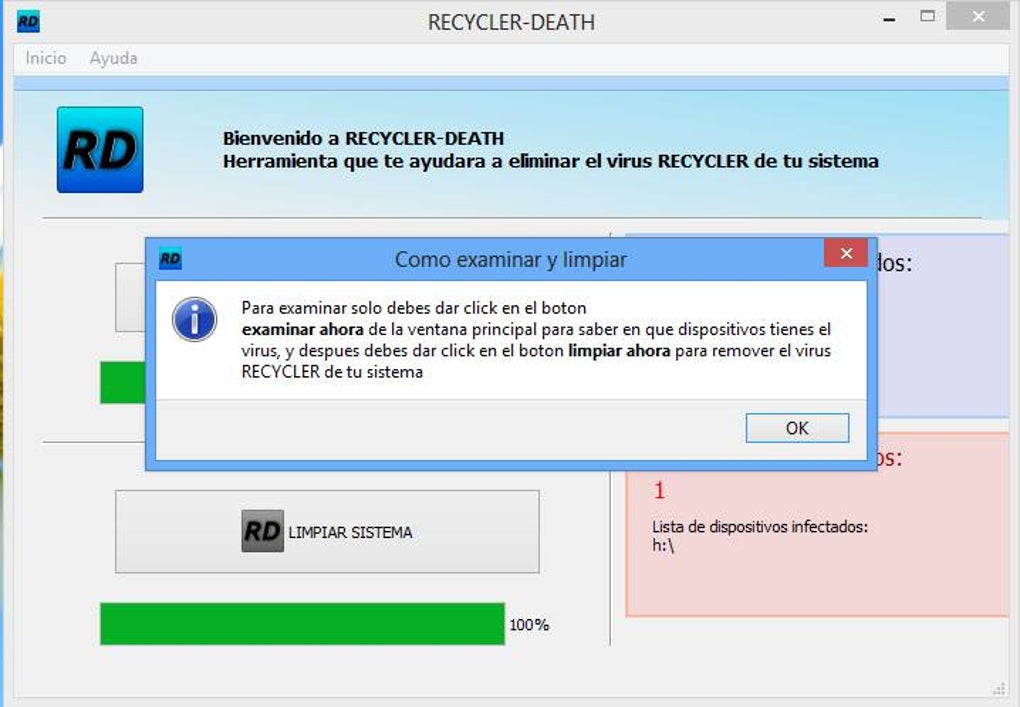Recycler Death is a free antivirus program for Windows, categorized under security software. While its name might evoke a sense of dramatic finality, its effectiveness as a security solution warrants a closer examination. Developed by Louis Corporation and first appearing on Phanmemfree on February 3, 2015, Recycler Death has garnered a moderate user base and a mixed reception, requiring a comprehensive assessment of its capabilities and limitations. This review will dissect the software’s features, performance, user experience, and overall value proposition to provide a complete understanding of its strengths and weaknesses.
Understanding Recycler Death’s Functionality
Recycler Death positions itself as a straightforward antivirus program aimed at protecting Windows systems from malware. Its core function involves scanning system files and drives for known viruses, trojans, worms, and other malicious software. The software’s simplicity is a double-edged sword. While it might be easy to use for less tech-savvy users, this simplicity often means a lack of advanced features found in more comprehensive security suites. The absence of a detailed description of its scanning algorithms or virus detection engine leaves users uncertain about its technological underpinnings and its efficacy against emerging threats.

The software’s claim to fame is its purported ability to detect malicious entities. However, user reviews on platforms like Phanmemfree indicate mixed results. Some users report success in identifying malicious files, while others contend that the program detects threats but fails to remove them effectively. This inconsistency highlights a critical weakness: the software’s inability to consistently neutralize detected threats renders its detection capabilities largely ineffective. A successful antivirus program requires both robust detection and efficient removal processes. The failure to eliminate identified threats is a significant drawback, essentially rendering Recycler Death a detection tool rather than a full-fledged protective solution.
User Interface and Experience
Recycler Death’s user interface is reportedly simple and intuitive, catering to users with minimal technical expertise. This simplicity might appeal to users who prefer straightforward software without complex settings or configurations. However, this streamlined approach also sacrifices customization options and advanced control over scanning parameters. The absence of granular control means users have limited ability to tailor the scanning process to their specific needs, potentially hindering its effectiveness in detecting deeply embedded or obfuscated malware.
The limited availability of the software in only English poses a barrier for users who prefer other languages. This limitation restricts accessibility and makes the software less appealing to a broader international audience. The lack of multilingual support significantly hinders its market penetration and usability in diverse geographical regions.
Performance and Resource Consumption

Reports regarding Recycler Death’s performance and resource consumption are scarce and inconclusive. The absence of detailed performance benchmarks makes it difficult to objectively assess its impact on system resources. A key concern with antivirus software is its potential to slow down system performance, especially during scans. Without reliable data on its CPU and memory usage, potential users must remain cautious about its potential impact on overall system speed and responsiveness. This lack of information regarding performance impacts makes it difficult to evaluate its suitability for users with resource-constrained systems.
Security and Updates
One of the most critical aspects of any antivirus software is its ability to stay current with emerging threats and security vulnerabilities. Information regarding Recycler Death’s update frequency and mechanisms is limited. Regular updates are crucial for maintaining the effectiveness of virus definitions and ensuring the program’s capability to combat the latest malware. Without concrete information about update schedules and the process by which the software acquires updated virus definitions, users are left uncertain about its ongoing protection capabilities.
Comparing Recycler Death to Established Antivirus Solutions
Recycler Death operates in a crowded market dominated by established antivirus vendors offering comprehensive security suites with a wide range of features. Compared to market leaders such as Avast, Kaspersky, McAfee, and ESET, Recycler Death appears to be significantly lacking in several key aspects. Established players offer features like real-time protection, firewall integration, phishing protection, and anti-ransomware capabilities. Recycler Death, based on user reports and available information, lacks these crucial elements. Its functionality is essentially limited to on-demand scanning, which provides limited protection against active threats.
Conclusion: Is Recycler Death Worth It?
Based on the available information and user feedback, Recycler Death presents itself as a lightweight antivirus solution with a simple interface but significant limitations. Its primary weakness lies in its inconsistent ability to remove detected malware, rendering its detection capabilities partially ineffective. Furthermore, the lack of advanced features, limited language support, and absence of performance data raise concerns about its overall value proposition.
While its simplicity might appeal to users seeking a straightforward approach, its shortcomings in critical areas like malware removal and lack of crucial security features make it a less compelling choice compared to more established and comprehensive antivirus solutions. Users looking for reliable and comprehensive protection are advised to explore alternatives offering a wider range of functionalities and a stronger track record of security efficacy. The “Recycler Death” name, while evocative, ironically reflects the potential fate of its efficacy – a tool that detects but fails to eliminate, ultimately leaving users vulnerable to persistent threats. Until significant improvements are made to address the fundamental shortcomings outlined above, Recycler Death falls short of being a viable security solution for most users.
















